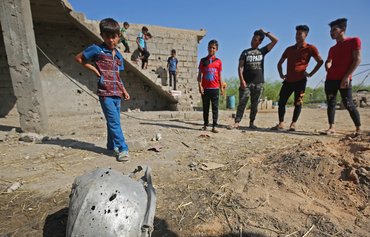JERUSALEM -- The United States on Thursday (July 14) vowed to "use all elements of its national power" to prevent Iran from ever acquiring a nuclear weapon.
It further affirmed its commitment to "work together with other partners to confront Iran's aggression and destabilising activities, whether advanced directly or through proxies and terrorist organisations such as Hizbullah", according to a White House statement.
The announcement came as part of a joint declaration the United States and Israel signed during US President Joe Biden's two-day visit to Jerusalem this week.
Biden's delegation will fly onwards to Saudi Arabia, Iran's main regional rival, on Friday.
Talks on reviving the 2015 Iran nuclear deal, known as Joint Comprehensive Plan of Action (JCPOA), have stalled as the Iranian regime continues to push ahead with secret nuclear activities and other flagrant violations.
A return to the deal would lift economic sanctions imposed on Iran, in exchange for its full compliance with the limits placed on its nuclear activities.
Yet Iran has continued to violate the terms of the agreement by expanding its nuclear activities, and has circumvented sanctions repeatedly by engaging in illegal financial activities, according to recent findings.
Ahead of the latest nuclear deal negotiations in Doha, facilitated by European Union (EU) mediators, Iran was constructing a vast tunnel south of the Natanz nuclear site, the New York Times reported June 16.
The move is "Tehran's biggest effort yet to construct new nuclear facilities so deep in the mountains that they can withstand bunker-busting bombs and cyberattacks", experts told the newspaper.
On June 17, Reuters cited an International Atomic Energy Agency (IAEA) document that said Iran is escalating its uranium enrichment further by preparing to use advanced IR-6 centrifuges at its underground Fordow site that can more easily switch between enrichment levels.
The 2015 agreement does not allow uranium enrichment at Fordow.
The United States Institute of Peace (USIP) also cited a leaked IAEA report on June 7, saying Iran has stockpiled more than 18 times the amount of enriched uranium allowed under the 2015 deal, describing it as "unprecedented".
The report said the growing stockpile means that "Iran could amass sufficient fuel for a single nuclear bomb in a few weeks".
The United States will not wait indefinitely for Iran to meet terms set by Washington to revive the nuclear deal, Biden said in Jerusalem on Thursday.
Asked how long the United States was prepared to give diplomatic efforts, Biden said his administration had set out terms required for the deal to be restored and, "we're not going to wait forever" for Tehran to respond, AFP reported.
In an interview aired Wednesday by Israel's Channel 12, Biden said Iran was "closer to a nuclear weapon now than they were before", adding that the United States would use force to prevent Iran from acquiring nuclear weapons "if that was the last resort".
Regional rapprochement
A new era for the Middle East was first charted on September 15, 2020, when the United Arab Emirates (UAE) and Bahrain signed agreements to normalise ties with Israel.
The agreements are aimed at bringing more stability to the region, and minimising the Islamic Revolutionary Guard Corps (IRGC)'s influence in the region.
The Biden administration is trying to bring Israel and its Arab neighbours together in a regional air-defence alliance that would protect the countries against threats from Iran and its allies, the Wall Street Journal (WSJ) reported Tuesday.
Israel has agreed to sell Bahrain drones and anti-drone systems, the newspaper said, citing a senior Bahraini official.
Israel's Mossad and Shin Bet security services have also been training Bahrain's intelligence officers, the unnamed source said.
And Israel has already offered to provide direct help to the UAE, which was the target of missile strikes from Iran-backed Houthi militants in Yemen earlier this year.
Tehran has threatened to strike out at the UAE and Bahrain if they allow Israel to place military installations in their countries, according to the WSJ.
Saudi Arabia has also been the target of missile and drone attacks blamed on Iran and its proxies. An Iranian drone attack on Aramco, the Saudi national oil company, in September 2019 heightened a sense of alarm about the growing drone threat in the region.
The normalisation deals between Israel and the UAE, Bahrain and Morocco have allowed those countries to increase trade and investment, as well as grow their military relationship.
In March, top diplomats from the four countries, as well as from Egypt and the United States, concluded a landmark meeting in Israel in which they vowed to boost co-operation.
The previous month, Israel and Bahrain signed a defence agreement, the first such deal with a Gulf country. The agreement covers intelligence, procurement and joint training.

![A B-52H Stratofortress awaits orders on the tarmac. [CENTCOM]](/cnmi_di/images/2022/07/14/36235-2013527-600_384.jpg)






